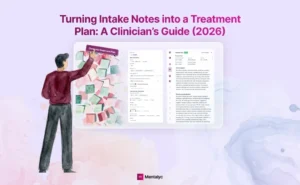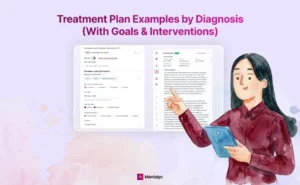Evidence-based practice (EBP) in mental health is perceived as the standard for delivering effective, personalized care. By weaving together scientific research, clinical expertise, and the unique needs of patients, EBP transforms treatment into a dynamic, patient-centered process. This approach addresses a long-standing challenge: bridging the gap between groundbreaking research and real-world therapy. In doing so, EBP ensures that interventions are not only backed by evidence but also tailored to resonate with individual clients. In this article, we’ll explore the core principles of EBP, highlight its transformative impact, and dive into practical examples that bring it to life. From proven therapies like CBT to cutting-edge digital tools, we’ll showcase how EBP is shaping the future of mental health care—making it more effective, accessible, and inclusive. Let’s uncover how EBP empowers both therapists and clients in achieving meaningful, lasting change.
Key Components of Evidence-Based Practice (EBP) in Mental Health
EBP’s foundation rests on three key components.
- Research Evidence: High-quality studies, particularly randomized controlled trials (RCTs) and meta-analyses, form the backbone of EBP. These studies provide reliable insights into the efficacy of interventions.
- Clinical Expertise: The clinician’s skill and experience play a pivotal role in interpreting evidence and tailoring it to individual clients.
- Patient-Centered Factors: Incorporating a client’s values, cultural background, and preferences ensures that care is not only effective but also aligned with their unique needs.
By uniting science, skill, and empathy, EBP transforms mental health care into a dynamic, patient-focused process that is as adaptable as it is effective. It’s more than a method—it’s a commitment to excellence in every interaction.
Why EBP Matters in Mental Health
Evidence-based practice (EBP) is not just a buzzword—it’s a game-changer in mental health care, profoundly shaping how clinicians diagnose, treat, and support their clients. Here’s why EBP is essential for creating meaningful, lasting impacts.
Transforming Clinical Outcomes with Evidence-Based Therapies
EBP has revolutionized the effectiveness of mental health care, offering a roadmap to improved outcomes across diverse populations. By integrating therapies supported by rigorous research, like cognitive behavioral therapy (CBT), clinicians can reduce symptoms of anxiety, depression, and other disorders more reliably than using untested or outdated methods. For example, CBT has been shown to significantly lower relapse rates in anxiety disorders compared to other approaches, giving clients the tools they need to sustain progress over time [2]. With EBP, treatment plans aren’t based on guesswork—they’re anchored in proven strategies that empower both therapists and clients.
Consistency Through Standardization
One of EBP’s greatest strengths is its ability to reduce variability in care. Clients receiving evidence-based treatments can trust that their care meets a high standard, no matter where they are or who their therapist is. This consistency ensures that every individual has access to reliable, effective interventions, fostering equity in mental health services.
Fostering Trust and Engagement Through Evidence-Based Approaches
In therapy, trust is paramount, and EBP plays a pivotal role in building that trust. Clients may engage and remain committed to treatment when they know the approaches are backed by scientific evidence. EBP reassures clients that their therapy is not just thoughtful but also grounded in the latest research. This trust enhances the therapeutic alliance, improving satisfaction and overall outcomes.
It is more than a methodology; it’s a promise to clients—a commitment to delivering the best care possible. By emphasizing effectiveness, consistency, and trust, it ensures mental health care is as impactful as it is compassionate.
Spotlight on Solutions: Examples of Evidence-Based Practices in Mental Health
When it comes to mental health care, evidence-based practices (EBPs) are as diverse as they are impactful. From tried-and-true therapies to cutting-edge innovations, EBPs provide a wealth of options to meet the unique needs of individuals. Here’s a closer look at the practices that are shaping the field.
Psychotherapy Interventions
Psychotherapy remains a cornerstone of EBP, with several approaches standing out for their effectiveness:
- **Cognitive Behavioral Therapy (CBT):** Known as the “gold standard” [3] for treating anxiety, depression, and PTSD, CBT helps clients identify and reframe harmful thought patterns. Backed by countless randomized controlled trials (RCTs), it consistently demonstrates its ability to reduce symptoms and prevent relapse. Whether it’s addressing social anxiety or managing obsessive-compulsive behaviors, CBT remains a go-to intervention.
- **Dialectical Behavior Therapy (DBT):** Designed for individuals with borderline personality disorder, DBT blends CBT principles with mindfulness techniques. Its structured modules focus on emotional regulation, interpersonal effectiveness, distress tolerance, and mindfulness. Beyond its initial application, DBT has proven effective for those struggling with self-harm or chronic emotional dysregulation [4].
- Acceptance and Commitment Therapy (ACT): ACT takes a unique approach by encouraging clients to accept difficult thoughts and emotions rather than fighting them. By fostering psychological flexibility and guiding clients toward value-driven behaviors, ACT is effective in treating chronic pain, anxiety, and even trauma-related disorders [5].
Pharmacological Treatments as Evidence-Based Mental Health Interventions
Medication is another vital pillar of EBP in mental health. Selective serotonin reuptake inhibitors (SSRIs), such as sertraline or fluoxetine, are widely recognized for their efficacy in treating depression and anxiety. For individuals with schizophrenia, antipsychotics offer well-documented benefits, helping to manage symptoms and improve daily functioning.
The Power of Combined Treatments
In many cases, the synergy of therapy and medication yields the best results. For example, combining CBT with SSRIs for major depressive disorder often leads to faster recovery and lower relapse rates compared to using either intervention alone. This dual approach leverages the strengths of both psychotherapy and pharmacotherapy, ensuring holistic care.
Emerging Interventions
The mental health field is constantly evolving, with innovative interventions expanding the horizons of EBP:
- Virtual Reality Exposure Therapy: By immersing clients in controlled virtual environments, this therapy helps individuals confront and desensitize their fears in a safe, manageable way.
- Digital Mental Health Tools: Apps offering guided CBT, mood tracking, or mindfulness exercises make therapy accessible and engaging. These tools are especially valuable for underserved populations who might otherwise face barriers to care.
From traditional therapies to groundbreaking technologies, EBPs in mental health demonstrate the field’s commitment to both innovation and efficacy. They ensure that clients receive the best possible care, grounded in science and tailored to their needs.
Examples of Evidence-Based Practices in Mental Health
Case Study: Alex and Social Anxiety
Alex, a 28-year-old marketing professional, seeks therapy to manage debilitating social anxiety. During an initial session, Alex describes avoiding work presentations and social gatherings due to fear of judgment. The therapist introduces cognitive behavioral therapy (CBT), explaining how it can help reframe Alex’s negative thought patterns.
In a session, the therapist uses a structured worksheet to help Alex identify an automatic thought: “If I speak up, everyone will think I’m stupid.” Together, they explore evidence for and against this belief. The therapist guides Alex to develop a more balanced thought: “It’s possible people may find my ideas valuable.” Gradually, Alex practices exposure techniques, starting with small social interactions, like asking a question in a meeting, before progressing to more challenging situations. Over time, Alex reports reduced anxiety and increased confidence.
Case Study: Mia and Chronic Emotional Dysregulation
Mia, a 22-year-old college student, struggles with intense emotions that lead to frequent conflicts with friends and family. She often feels overwhelmed by anger and sadness, resulting in impulsive decisions, like skipping classes or self-isolating.
In therapy, the clinician introduces DBT, focusing on the “distress tolerance” module. During one session, the therapist teaches Mia the “STOP” skill:
- S: Stop immediately when overwhelmed.
- T: Take a deep breath.
- O: Observe feelings and physical sensations.
- P: Proceed mindfully.
Mia practices this technique during moments of anger and reports back in subsequent sessions. To further support her progress, the therapist incorporates mindfulness exercises, helping Mia develop greater awareness of her triggers and manage her reactions. With time, Mia learns to pause, evaluate her emotions, and respond more constructively, strengthening her relationships and emotional resilience.
Putting It into Practice: How to Implement Evidence-Based Practices in Mental Health
Implementing evidence-based practices (EBPs) in mental health requires more than just understanding the research—it’s about translating knowledge into meaningful action. Therapists play a central role in this process, bridging the gap between theory and practice to deliver client-centered care that is both effective and empathetic [6, 7].
The Role of Therapists in EBP Implementation
Therapists are the driving force behind EBP. They bring the research to life by tailoring interventions to meet the unique needs of their clients. Staying current with emerging studies, attending professional development courses, and engaging in continuous learning are critical components of a therapist’s role. Beyond technical expertise, open communication with clients fosters trust and ensures that their preferences and cultural values are woven into the therapeutic process. This combination of informed knowledge and compassionate care makes EBP more than just a framework—it’s a personalized approach to mental health.
Practical Strategies for Implementation
- Decision-Making Tools: Utilizing structured frameworks like treatment manuals and clinical guidelines (e.g., APA guidelines) simplifies the integration of evidence into sessions. These tools provide clear pathways for applying research findings to real-world situations, reducing guesswork and enhancing consistency.
- Collaboration with Researchers: Partnering with academics and researchers helps therapists stay ahead of the curve. This collaboration ensures that new findings reach the clinical setting faster, creating a dynamic feedback loop between research and practice.
Case Study: Jordan and Major Depressive Disorder (MDD)
Jordan, a 35-year-old teacher, presents with symptoms of major depressive disorder, including persistent low mood, difficulty concentrating, and disrupted sleep. The therapist team uses the APA’s treatment guidelines to inform their approach, which recommends a combination of CBT and selective serotonin reuptake inhibitors (SSRIs) for moderate to severe depression.
The therapist collaborates with Jordan to create a treatment plan. They outline short-term goals, such as establishing a regular sleep routine, and long-term goals, like returning to hobbies Jordan once enjoyed. The therapist also provides psychoeducation about antidepressants, coordinating with Jordan’s primary care physician to explore medication options.
During therapy sessions, the clinician uses behavioral activation techniques, encouraging Jordan to schedule enjoyable activities, starting with simple ones like walking the dog. As Jordan begins to see improvements, the therapist introduces cognitive restructuring to address unhelpful thoughts like “I’ll never feel better.” This combination of EBP strategies helps Jordan regain a sense of agency and hope.
Overcoming Barriers to Evidence-Based Practice Adoption in Mental Health
Despite its benefits, implementing EBP isn’t without challenges. Therapists may face obstacles such as limited access to training, heavy caseloads, and even resistance to change within their organizations. However, these barriers can be addressed through targeted solutions:
- Accessible Resources: Providing therapists with user-friendly databases, workshops, and online training makes staying updated more manageable.
- Professional Development Opportunities: Offering regular, high-quality training sessions equips therapists with the skills they need to implement EBPs confidently.
- Organizational Support: Creating an environment that prioritizes EBP—through leadership buy-in and supportive policies—ensures that therapists have the time and resources needed to adopt these practices effectively.
Implementing Evidence-based practice is both a challenge and an opportunity. With the right tools, collaboration, and support, therapists can bring the best of research into the therapy room, transforming mental health care into a process that is as effective as it is empathetic. It’s not just about doing what works—it’s about making it work for everyone.
Case Study: Fatima and Trauma Recovery
Fatima, a 40-year-old immigrant from Syria, experiences symptoms of post-traumatic stress disorder (PTSD) stemming from her experiences during the war. She feels disconnected from her community and hesitant to seek help due to cultural stigma around mental health.
The therapist takes a culturally informed approach, first building trust by acknowledging Fatima’s cultural background and values. Using evidence-based trauma-focused CBT, the therapist helps Fatima process her traumatic memories in a safe and structured way. Recognizing Fatima’s spiritual beliefs as a source of strength, the therapist incorporates mindfulness techniques that align with her practices of prayer and reflection.
To reduce stigma, the therapist uses psychoeducation to normalize seeking help, explaining how PTSD affects the brain. By weaving cultural sensitivity into Evidence-based practice, the therapist ensures that Fatima feels understood and supported, enabling her to make significant progress in her recovery.
The Road Ahead: Future Directions in Evidence-Based Practice for Mental Health
Evidence-based practice (EBP) is a dynamic and ever-evolving framework, and its future promises exciting advancements that will shape the mental health landscape. From leveraging cutting-edge technology to expanding the focus on prevention and refining research methodologies, EBP is poised to become even more impactful.
Advances in Technology
The integration of technology into mental health care is revolutionizing how Evidence-based practice is delivered and accessed. Artificial intelligence (AI)-driven tools offer clinicians personalized care recommendations by analyzing vast datasets. These tools can identify patterns and suggest tailored interventions, ensuring treatment is precise and client-specific. Additionally, teletherapy platforms and mental health apps have broken down traditional barriers to care, making therapy accessible to those in remote or underserved areas. Features like mood tracking, guided CBT exercises, and virtual reality exposure therapy enhance client engagement and adherence, bringing EBP directly to people’s fingertips.
Focus on Preventive Care
While EBP has traditionally emphasized treatment, the spotlight is shifting toward prevention. Evidence-backed, community-based interventions, such as resilience training workshops and school-based mental health programs, are emerging as powerful tools to reduce the incidence of mental health disorders. These preventive measures focus on early intervention, equipping individuals with coping mechanisms, and fostering mental wellness before conditions escalate. This proactive approach not only improves individual outcomes but also alleviates the long-term burden on mental health systems.
Improved Research Methodologies
As EBP evolves, so too must the research that underpins it. Traditional randomized controlled trials (RCTs), while valuable, often fail to capture the nuanced complexities of real-world therapy settings. Future research should embrace mixed-method approaches, blending the statistical rigor of quantitative data with the depth of qualitative insights. By incorporating perspectives from diverse client populations and real-world contexts, these methodologies will enhance the applicability and inclusivity of EBP, ensuring it remains relevant and effective.
The future of Evidence-based practice in mental health is brimming with potential. By embracing technology, prioritizing prevention, and refining research practices, EBP will continue to evolve into a framework that is not only evidence-driven but also adaptable, inclusive, and transformative. This forward momentum ensures that mental health care will meet the challenges of tomorrow with innovation and compassion.
Conclusion: Advancing Mental Health Through Evidence-Based Practice
Evidence-based practice (EBP) stands as a pillar of modern mental health care, combining research, clinical expertise, and client values to deliver effective and personalized interventions. Its impact is undeniable, improving outcomes, standardizing care, and building trust between therapists and clients. By prioritizing what works, EBP ensures that mental health care is both scientifically sound and deeply human.
While challenges such as accessibility barriers and the need for cultural inclusivity persist, they present opportunities for growth. Advances in technology, a greater focus on prevention, and the adoption of more inclusive research methods are paving the way for a future where EBP is more accessible, adaptable, and equitable. These innovations highlight the field’s commitment to evolving in response to real-world complexities.
As therapists and mental health professionals continue to embrace EBP, they bridge the gap between research and practice, ensuring that care is not only effective but also meaningful and inclusive. With its foundation in evidence and its heart in empathy, EBP will continue to lead the way in transforming mental health care for the better.
Why other mental health professionals love Mentalyc

“It immediately changed my quality of life, personally and professionally.”
Owner/Independently Licensed Marriage & Family Therapist (LMFT)

“If I were recommending this software to a colleague, I would tell them that it is the best thing that they could do for their practice.”
Licensed Professional Counselor

“For anyone hesitant: this is a lifesaver. It will change your life, and you have more time to be present with your patients.”
Licensed Clinical Social Worker

“Do yourself a favor, make your life easier. I found Mentalyc to be one of the best tools that I’ve ever used.”
Licensed Marriage and Family Therapist







